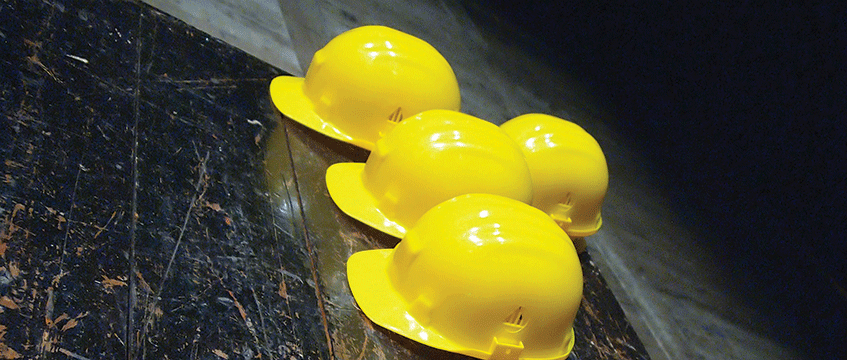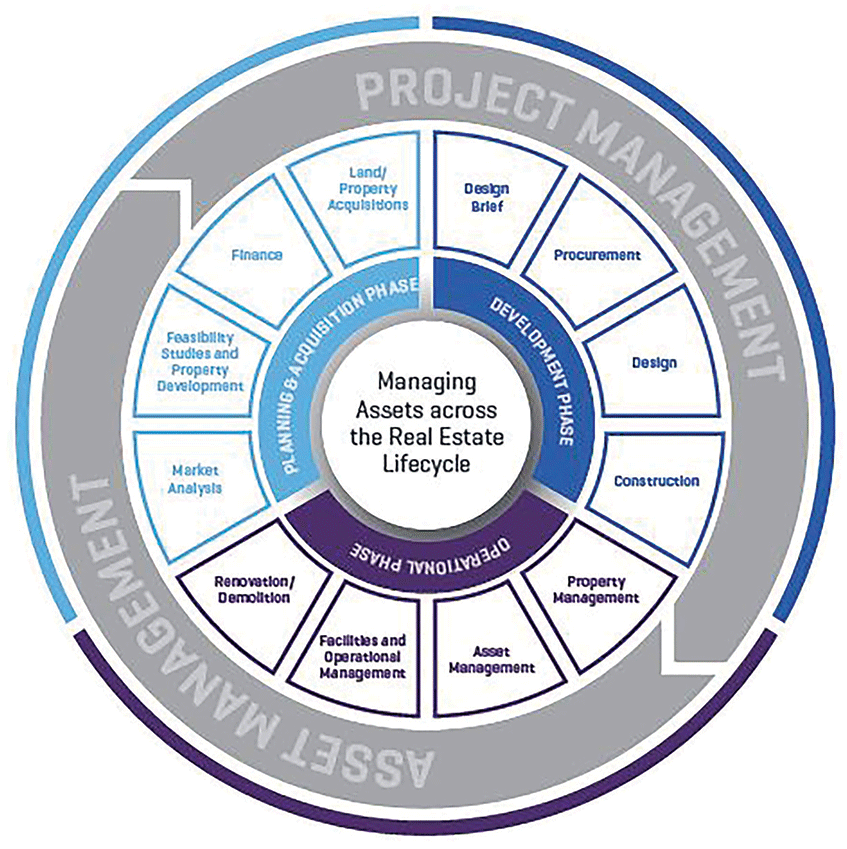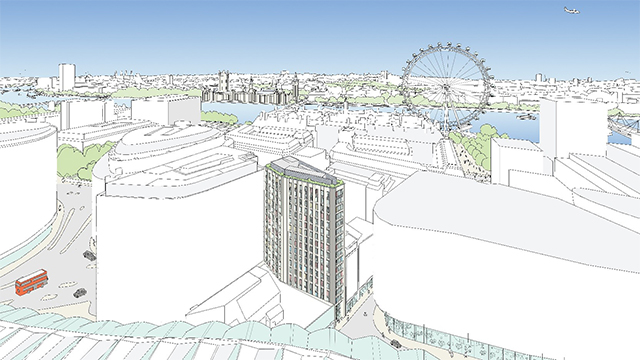In this APC Series article, Jen Lemen takes a look at how the various RICS APC pathways fit within the property lifecycle.
The Royal Institution of Chartered Surveyors has defined the property lifecycle in the circular diagram below. It starts with the initial client requirement to acquire a property, including various stages of market analysis, feasibility and securing finance.
Once the property (or site) has been acquired, a new building could be constructed or the existing building could be renovated or refurbished. Alternatively, if a new building is acquired then the property may need to be fitted out. When construction or any works have been completed, the occupational stage of the lifecycle begins, including property management, asset management and facilities management. At some point in the future, the building could near the end of its economical life and may be subject to further renovation, refurbishment or full demolition. Alternatively, the client’s requirements may change and the building may be disposed of to another party.
So why is this important to surveyors?
Surveyors are involved in all stages of the property lifecycle. However, the type of surveyor that you are, or what APC pathway you are following, will most likely dictate when you will become involved in this lifecycle. As a surveyor, you are also likely to work within multi-disciplinary teams, including various other surveyors and built environment or property professionals, eg architects, structural engineers, solicitors and contractors. Knowing the scope of practice and role of other professionals is key to providing a high standard of service to clients. This could be by knowing when and who to refer out to for specialist advice, or knowing when your advice may overlap with that of another professional. In the latter case, examples include when a property manager may need to liaise with a letting agent, or a valuer may need to collaborate with an agency surveyor.
It is also essential to be able to explain to clients how your specific role fits within the wider property lifecycle, showing the value that you can add and how you will provide a seamless service to the client.
The table opposite gives examples of how the different APC pathways fit in within the different stages of the property lifecycle. It covers a number of the main pathways, although do note that there are 22 in total to choose from.
Knowing where you, as a surveyor, fit within the wider property lifecycle is key. This helps ensure that you act within your scope of competence, can recognise areas where you can add value to clients and where you may need to recommend the services of another professional. This ensures that you provide a high standard of service to your clients and that you act with integrity – some of the key tenets of the RICS Rules of Conduct.
|
APC pathway |
Property lifecycle |
|
Building surveying |
Building surveyors are typically involved in all stages of the property lifecycle. They may be involved in providing a building survey prior to acquisition, through to contract administration of construction projects and specifying refurbishment works. They may also advise on specific defects or deal with party wall disputes. Building surveyors are likely to liaise with property managers when a managed property requires repairs, or with an agency surveyor during the acquisition process for a property. |
|
Commercial real estate |
Commercial real estate surveyors may be involved in acquiring and disposing of properties, as well as dealing with various instructions during the occupational stage. This could include property management, valuation, leasing/letting, strategic real estate consultancy and taxation. In a multidisciplinary practice, a surveyor may find that they need to refer clients to other types of surveyor, eg a registered valuer for a financial reporting valuation or a building surveyor for repairs. |
|
Corporate real estate |
CRE surveyors will generally work in-house, or client side, and be involved in the whole property lifecycle. This could include justifying the business case for an acquisition, and ensuring that the acquisition aligns to wider corporate objectives. As for a commercial real estate surveyor, they will also be involved during the occupation stage and may liaise with external consultants to provide specific input, eg a letting agent or contractors. |
|
Management consultancy |
Management consultants will again be involved at all stages of the property lifecycle with the objective of providing consultancy services to advise on business solutions to real estate problems. This may require input from other surveyors, particularly when collecting data and analysing and advising on solutions. They may then need to work with other teams to deploy solutions and monitor performance. |
|
Planning and development |
Planning and development surveyors will perform a key role in the acquisition and development of sites, including advising on viability, returns and planning policy. They may also specialise in various areas of planning or development, such as contaminated land, access and rights, master planning and housing strategy. They will require input from other surveyors, such as valuers and agency surveyors when acquiring sites and quantity surveyors when assessing build costs. |
|
Property finance and investment |
PF&I surveyors will play a key role in analysing and advising on funding or finance for acquisitions, through both debt and equity. They may also advise on investment management and financial modelling, eg to advise if an investment strategy will generate the desired returns. An investment manager may instruct other surveyors to carry out property-specific work, eg a letting agent or a building surveyor. |
|
Residential |
Residential surveyors provide advice in a wide variety of scenarios, typically during the occupational phase. This could include advice on condition (referring in some cases to a building surveyor), valuations, block management or purchase and sale work. Residential surveyors can cover a wide scope of practice, with some advising on both condition and valuation-based work. |
|
Rural |
Rural surveyors may be involved across the property lifecycle, depending on their specialism. This could be planning, agency work, valuation or agriculture, for example. They may liaise with other surveyors during the construction phase of a new rural or agricultural building or a planning specialist for a new scheme (eg a class Q barn conversion). |
|
Valuation |
Valuation surveyors may provide valuation advice on a newly acquired site, all the way through to a building in use or that is being disposed of. They may need input from other surveyors, such as a quantity surveyor on construction costs for a residual land valuation or an agency surveyor on market conditions or comparable evidence. |
Jen Lemen BSc (Hons) FRICS is a co-founder and partner of Property Elite












